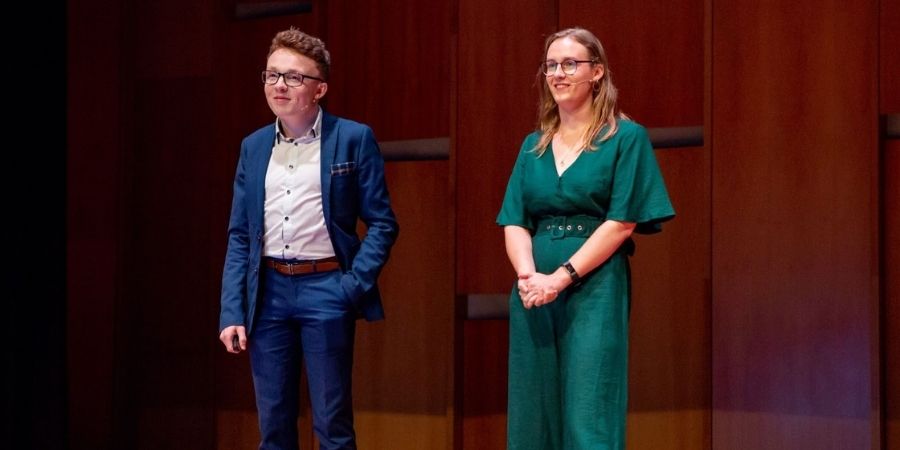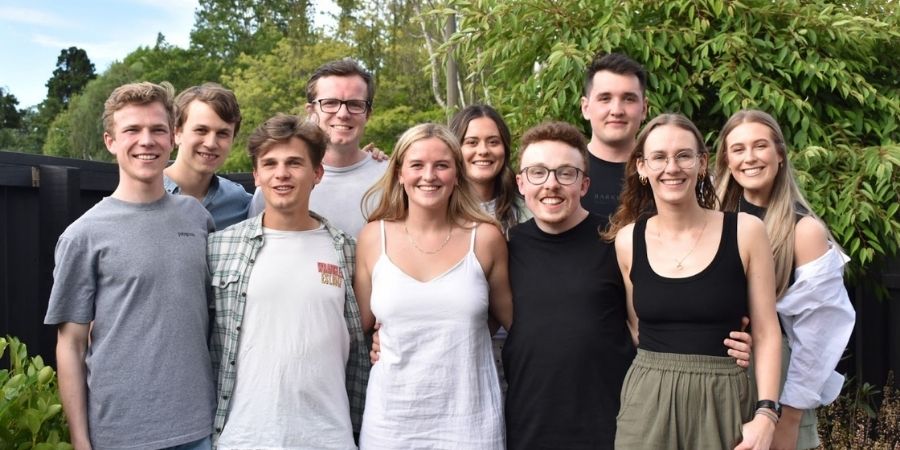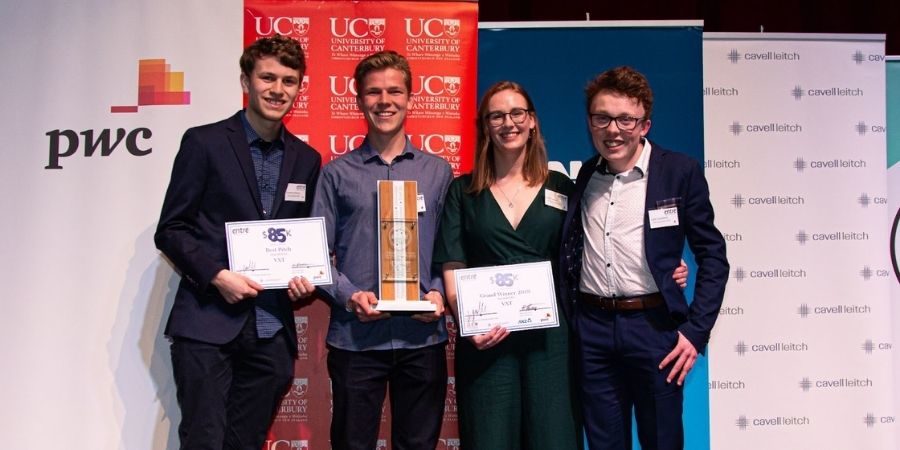Meet Luke Campbell – The Young Founder Behind Vxt, New Zealands Next Tech Unicorn
TL;DR
If you only have a couple of minutes to spare, here’s what you should know about Luke and Vxt.
• Vxt started as a voicemail app founded by Luke Campbell (CEO) and Lucy Turner (CTO). It has taken them two years to find a winning product/market fit formula.
• Vxt grew into a communication platform. They’re transforming into an all in one communications platform on a mission to “automate the world’s admin.”
• Vxt is growing quickly and on track to become a New Zealand tech unicorn. After intense customer validation and pivoting to a communications platform, they see upwards of 15% weekly usage growth.
• Intense customer validation and raising capital have been the two most pivotal moments in the company’s history to date. Their first capital raise kept them alive long enough to pivot. And customer validation has helped them find a larger and more valuable problem to solve.
• Vxt is building a solid foundation on the back of a strong vision, transparent culture, and a young team adapting quickly.
After intense customer validation and a significant pivot, Vxt is on its way to becoming New Zealand’s next tech unicorn.
They’re building a communication platform on a mission to automate the world’s admin. Initially a voicemail transcription app, Vxt pivoted towards a full-scale communication platform at the beginning of 2021. And have just crossed $300k in ARR.
They have a clear vision, with many opportunities in front of them that they’re moving quickly to capture – like their soon-to-be-released Vxt Video.
They saw 15% platform usage growth just last week, well ahead of Paul Grahams (Y Combinator founder) high-bar 10% week on week growth rule.
Luke has many valuable lessons to share from his experiences building an MVP, raising capital, customer validation, and product pivots.
But before we get to that, let’s jump back a bit.
Luke has been interested in entrepreneurship since high school. He knew he wanted to start a business but didn’t know-how. “I didn’t have a clue. Like, not a thought in the world. I thought I could do it and It wouldn’t be too complicated, but where do you start?
After sharing his hesitation with a mate at Uni, they gave him the nudge he needed to get started.
Luke went and spoke to the folk at the Centre for Entrepreneurship at the University Of Canterbury and joined a course called Enterprise in Practice. Where you work on your or someone else’s idea and work through the steps to bring it to life.
“It taught me a lot of foundational stuff.” “Ultimately, the most important thing I learned was you’ve got to identify a problem worth solving.”
He wanted to be “smacked in the face with something really frustrating” rather than going after any odd issue. “Around that time, I got a few voicemail messages, and I thought, well, this is f**king painful; it took me like half an hour just to check a few messages.“
“I had to top up my phone. I had to call the weird robot press a bunch of buttons – it was painful” “I can remember looking at my phone and thinking well, this is what I’m looking for.”
After a quick google search, he realised there wasn’t a New Zealand solution, and the seed for Vxt was planted.
Solving Problems, Raising Money, and Launching An MVP
As I touched on above, Luke stumbled onto the idea for Vxt after getting frustrated trying to access his voicemails.
He thought a good solution might be an app that delivers voicemail as a message. I didn’t think any further than that. “I just thought solving the voicemail problem made sense.“
Luke doesn’t have development skills, but Lucy, his partner, was halfway through a computer science degree and after “quite a few long conversations“. He convinced Lucy to help.
I’d been involved at the centre of entrepreneurship for eight months by then. So I had built relationships with the people there. As a result, I was confident that Lucy and I would get a scholarship to work on the app over Summer.

After being accepted into the Summer Startup Programme, they set out to build Vxt. We were going to build an app and feel out the concept more and more over the following months.
They’d learned a lot by the end of the program but hadn’t built anything. Luke spent the summer networking, speaking to potential customers and reading about entrepreneurship. At the same time, Lucy learned about app development and tried to solve their first big technical hurdle. How do you get access to someone’s voicemail?
Then another roadblock stood in their way. Once we got access to people’s voicemails, we couldn’t identify whose voicemail was who. I couldn’t say that’s yours and this is mine. With a service like that, we couldn’t support more than one person at a time. At this point It wasn’t obvious there was a solution. However, Luke thought, at the very least, “the experience would still be valuable“.
While Lucy worked on their attribution problem, Luke spent the first half of 2019 trying to get money so we could accelerate the process [of building Vxt] once Lucy figured out this technical issue. I was entering startup competitions, applying for awards and stuff like that. We ended up raising close to $200000 in services and some cash.
After eight months of problem-solving, networking, and gathering resources, they started building. I hired a bunch of student developers to help us. We started building the app at the end of June and released the first version six weeks later – which was hideous. I could send you screenshots; it’s horrible. The first version of your product is a tool to test your ideas. It shouldn’t be polished because you might be wasting your time.
Luke wanted to move fast and believes in an aphorism often mentioned by LinkedIn founder Reid Hoffman. If you’re not embarrassed by the first version of your product, you’ve released it too late.
Say, instead of releasing an MVP in six weeks, we waited three months and released a nicer, tidier version of Vxt, but no one used it regardless of the design because it didn’t solve a problem, then we’ve wasted an enormous amount of time. Release an initial version quickly, and get traction to justify further investment or pivot.
Vxt struggled financially over the next few months. They needed to make money and started working on adding paid subscriptions to the app – a more challenging technical problem than you’d think. Subscriptions were released in October, almost a year since starting the Summer Internship.
Getting Your First Users And Paying Customers
Luke told anyone who’d listen about Vxt. I was such a drumbeat. As soon they launched the app in June of 2019, he reconnected with everyone he’d spoken with to announce the arrival of Vxt.
I’m emailing everyone, messaging people on LinkedIn, posting on LinkedIn, doing everything I can to get users. That was good enough to get us about 100 users within the first couple of weeks after launching.
Once his network ran dry, Luke started looking for other ways to find users. They had no money and didn’t know how to run ads. So he got crafty. You can post for free in Facebook groups, so I messed around with that. He found some groups that loved the Vxt app, and many of those early supporters became long-term users.
Luke had also been holding on to a press release which he was confident would do well. We’re a bunch of young people that have built an app to solve a relatable problem. Everyone gets voicemail. Everyone hates voicemail. It seemed like a good story for the press.
So they spent a thousand dollars to put together a release with the help of an agent with journalist contacts. Over the first few weeks, they got published on some websites, but it had little impact.
Then on a Monday, the Press (regional new site) and Stuff (national new site) picked it up – a few hours later, we’d doubled our user base.
That afternoon they were asked to go live on The Project and Seven Sharp (current events/national tv shows). We grew our user base by a thousand per cent in 24 hours, up from about 400 to over 5000 users. This all happened in the middle of exam week for Luke & Lucy, who were still full-time students.
Telling Stories And Raising Money
In early 2020 Luke & Lucy transitioned to focusing on Vxt full-time alongside Cameron Palmer, one of the students they hired the year prior. However subscription revenue wasn’t enough to cover three full-time staff, so they decided to raise capital.
$400,000 was the initial target. It’s approximately the same amount of capital that most companies at our stage with first-time founders raise. We stuck our fingers in the air and tried to guess what was realistic for us to achieve and shoot for it.
After announcing their raise, they were published in the New Zealand Herald (national newspaper), which was intimidating. I remember getting it in the news and thought, that’d be embarrassing if we abysmally failed.
The NZ Herald article helped them close $200,000 virtually overnight. But then Covid hit, and early-stage investment around the world halved. Only well-organised startups with experienced founders were able to raise at that time – Lukes’s team were still finding their feet.
As a founder, you have to be comfortable with rejection; raising money in 2020 was really challenging. Definitely the hardest period of the business. It was a stressful time for me.
By July, they had almost resolved to close the round at $200k but found a last-minute investor, who put in another $400k. And closed with $600k in September.
Luke has some valuable takeaways to share from this experience.
To raise capital, you’ve got to nail networking and process.
1. Network: be prepared to meet with a large number of investors (~100)
2. Process: fundraise during a short, fixed period to create urgency and show confidence
If you can create an artificial sense of urgency and demand. You’re going to get a better deal. I’ve got friends who’ve raised sizable funding rounds, like tens of millions of dollars on revenue, multiples of 100x or more.
3. Communicate: tell a compelling story about the future of the world and how your company will be pivotal in creating it
Outside of these three, you need to be able to show business traction to investors.
Customer Validation And Pivoting
After closing their round, Luke took a quick break before tackling their next problem.
While trying to complete the capital raise, it became clear to me that we would not achieve our ambitions by maintaining the course we were on. The unit economics, which had been great, were turning to shit. We had to pivot.
So they engaged in intense customer validation in the hope of finding a bigger, more valuable problem to solve. This is formal, macro problem identification. By interviewing 100 people, over hour-long calls.
We did that well. It became clear that there were various serious problems for a particular group of people. More specifically, a few problems that were easy for us to solve in the short term and valuable enough to be good business. So we got more and more confident from September to February.
Luke had a few pointers on customer validation.
• Don’t ask leading questions, and do not talk about your solution until you have finished questioning your interviewee.
• The interviews aren’t just about looking for problems. They’re an opportunity to learn deeply about how your customers live.
And shared good questions to ask, start with;
How much time do you spend doing what activities? What do you do when you wake up in the morning? What do you spend your time on at work, like email, phone calls, writing, etc? How much time do you spend on these things? What is a frustrating task you have to do semi-frequently, say maybe once a day?
Then turn your attention to specific issues that you might be able to solve. In Vxt case;
How many calls do you make every day? How many voicemails do you get every day? What software do you use daily and why?
The most important question we asked was, what do you have to do daily or weekly that frustrates you?
We avoided telling them what we are thinking about building until the very end because the second you tell someone your idea, they will answer your questions with that in mind.
As soon as you have people repeatedly saying the same thing, you know you’re onto something. We spoke to lawyers, and every one of them mentioned the same two problems. By early 2021 they knew what to build, Vxt Call.
They went from thinking Vxt Call was a feature they might add to Vxt Voicemail to realising it should be their focus. This was a big pivot – a totally separate product, a massive investment and technology change.

Luke credits customer validation as an inflection point in their company’s history. It’s crucial because you can create an incredibly valuable business if you do it well and identify a worthwhile problem to solve.
You’ve got to know what not to do as well. There were a few recurring problems that the people they interviewed were facing which Luke felt was outside the scope of Vxt.
For example, lawyers find quoting jobs for their customers super hard because of many moving factors. But that was out of our scope; we aren’t here to solve that problem.
And know who you’re not serving. It would have been easy for Vxt to think they were creating a calling solution for all lawyers. We also identified the people who didn’t face that problem in the legal sector. We could have said all lawyers are our customers, but they aren’t. We’re only helping lawyers who make many calls, which turned out to be about half of them.
They Grew Vxt Call Slowly; Now Momentum Is Taking Over
It’s been a year since Vxt Calling was released. In that time they’ve grown annual recurring revenue to $300,000+.
In the first week of March 22, they had as many free trials as they did for all of February and are seeing up to 15% weekly growth in usage.
The first customer of Vxt Call was a friend that Luke asked to use the product as a beta tester while they ironed out product kinks.
Getting paying customers onto the platform was tough. We didn’t know how to train people to use our platform. So during the early days, growth was slow.
Luke didn’t go into further detail here, but they grew one customer at a time, from what I gather. As they’ve improved from each iteration, they’ve been able to grow faster, and word of mouth is slowly taking hold.
Today their main growth channels are direct outreach and partnerships. They also get leads from Linkedin where Luke is active.
They’ve got a sales team of four (including Luke). And are in the process of formalising a partnership with one of the most well-funded startups in Europe.
The Future For Vxt
With a growing team (8 and counting), Luke has been putting some time towards cementing a vision for Vxt and planting the seeds of good company culture.
Over the past year, I’ve come to a long term vision for the business, which is something I’ve struggled with. I’ve always been super pragmatic. Thinking about a vision for Vxt 10 years down the track was tough. I’m more interested in what we’re doing tomorrow.
I wasn’t happy with the vision for a long time, as I didn’t understand its value. Now I do, and the future is very clear, which is exciting. The mission of the company is to automate the world’s admin.
Sometime in the future, 10, 20, 30 years, there’ll be no more admin work, and people will spend less time at work. More work time will be spent building relationships and driving real value.
Ultimately Vxt wants to be the provider of all their customer’s communications requirements. Like video, email, SMS, internal chat, calls, voicemail, everything. And leverage that data to automate their administrative work – off of the back of those communications.
Thoughts On Being A Young Founder With A Young Team And Many Demands For Attention

The Good Stuff:
Being a young Founder is good because you don’t know what you don’t know. You’re blindly confident, which is valuable in many situations because it makes you willing to try stuff that most wouldn’t.
The Less Good Stuff:
It’s harder to sell to customers and pitch investors. Due to the nature of your age, people are less trusting, and you have less authority.
Also, not knowing how to get funds and stuff like that, you’ve got less experience with big things. You can screw something up that’s otherwise easy [with experience] to get right if you’re unlucky.
Dealing with more demands for your time as you get traction.
I only ever do things that move the needle. Unless I think it could result in revenue for the business, I don’t do it. But ultimately, there is a great deal of work that goes into supporting revenue operations. And helping your team is, of course, good for business.
Sometimes I make an exception if I have a strong personal interest. Like speaking, I enjoy that – I’m just like any entrepreneur; I love hearing the sound of my own voice. And you get to network with people. You never know what those relationships will turn into.
I used to find saying no really hard. But it’s easy now.
Dealing With Stress And Looking After Your Mental Health As A Founder
On our call, Luke mentioned mental health struggles such as panic attacks and extended periods of disassociation. So I asked if he had any tips for others going through similar struggles.
On top of making regular exercise a habit and priority – exercise is a big one. Luke cut coffee consumption down from a peak of 5 cups per day during their first capital raise to one, which had an immediate positive effect on his mental health.
Research shows caffeine and nicotine and all of these ‘ines – those particular chemicals induce anxiety. So they might not be a problem now, but if you add extra stress and anxiety into your life, they suddenly become the straw that broke the camel’s back.
Later in our conversation, I asked Luke if he’d struggled with loneliness or felt isolated as a founder.
My advice is to find a community of people trying to do the same stuff as you. Not necessarily mentors, but peers who you can shoot the shit with. People that can relate to the problems you’re facing.
A co-working space, online communities, or if you’re a student, there’s probably an entrepreneurship thing at your university that you can be a part of. Find something like that.
When we were raising money, I didn’t have many entrepreneurs in my circles to vent to. So I was drinking lots of wine, stressed out of my mind, and my flatmates and friends couldn’t relate to the problems I was facing for no fault of their own.
Would You Rather: A Space-X Earth Orbit Flight Or An Hour Chat With Elon Musk?
We finished the chat with a would you rather question.
My dream is to go to space. Elon Musk was an idol of mine in high school. I have a lot of appreciation for the guy, although he’s a bit crazy.
For now, I’d take the flight because I’m not sure how valuable time with Elon would be. If spaceflight were more accessible today, I’d probably change my mind.



Comments: 2
Pingbacks and Tracebacks
[…] This is a must-read for young founders in the tech/saas space. […]
[…] who we profiled a few months back, turned a $1,000 PR investment into a $600k capital […]